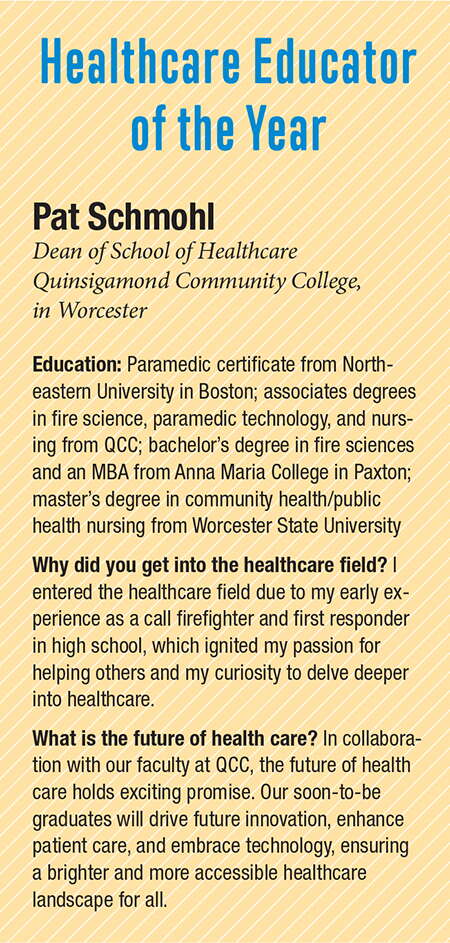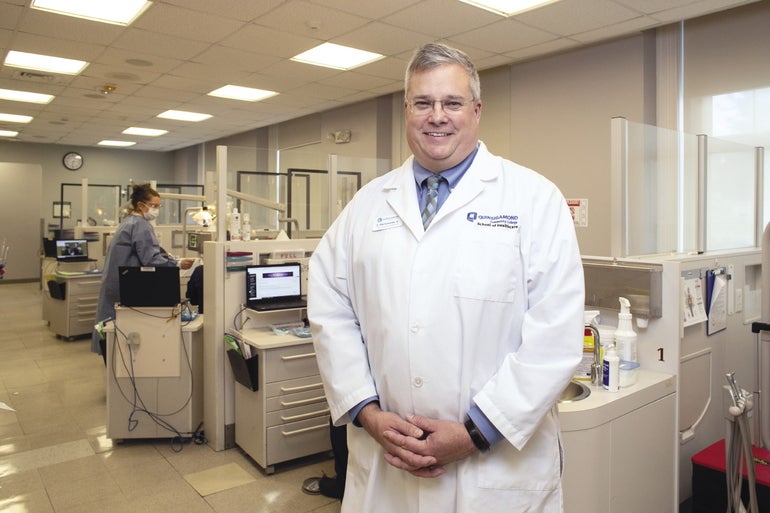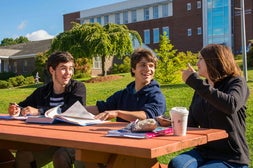
Champions of Health Care: Schmohl connects deeply with students
 PHOTO | Matt Wright
Pat Schmohl, dean of the Quinsigamond Community College School of Healthcare
PHOTO | Matt Wright
Pat Schmohl, dean of the Quinsigamond Community College School of Healthcare
When Becker College in Worcester closed its doors in 2021, it left about 100 students pursuing nursing degrees with no place to go. That’s when Quinsigamond Community College and Dean of the School of Healthcare Pat Schmohl stepped up.
“Listening to [the students], their lives changed so abruptly. I never wanted anybody to be put in that position,” he said.
This desire to serve the community makes Schmohl stand out as a leader in the Central Mass. healthcare industry. But what truly sets him apart is his empathetic nature. Schmohl and his staff stepped in quickly to get the Becker students set up for success at QCC.
“We had to go through all their courses and align them with ours, and do a bridge course because we taught things in a different order than Becker,” he said.

A Princeton native and a nurse, paramedic, and firefighter by trade, Schmohl said he always felt teaching was in his blood. He taught skiing at Wachusett Mountain as a high schooler, and in the 1990s, he traveled to Armenia to teach emergency room trauma treatment.
“I loved being a paramedic, and I wanted to make sure others knew how great it was; and if they wanted to know more, I could help them,” he said.
He joined QCC in 2005, teaching in the paramedic and fire science programs, eventually pursuing nursing to become a better resource to students. He got a master’s degree in nursing in public health from Worcester State University, where his mindset shifted from thinking about patients as individuals to part of a larger community. “That’s how I moved into administration,” he said.
Viviana Abreu-Hernandez, QCC vice president for external affairs, has a packed resume in higher education. She was executive director of higher education in Puerto Rico and director of research and program development for 1199 SEIU, the largest healthcare worker union in the country. In her vast experience, Abreu-Hernandez said she has never seen a dean of healthcare who connects with students like Schmohl.
“I have never met a dean that understands the work shortages like he does, or who cares about their students' success like he does. I have never met a dean that continues to be directly related to the practice of health care. Usually the deans have no contact with patients or have no contact with students,” she said.
Diversity and inclusion are key parts of the culture of QCC’s School of Healthcare, Abreu-Hernandez said. The first time she sat down with him to ask about grants, he requested training for all professors in diversity, equity, inclusion, and multiculturalism.
“No one has ever said that to me,” Abreu-Hernandez said. “He was telling me, ‘My professors cannot teach what they don't know.’ There’s so much implicit bias in care that if our professors do not know how to teach students to understand and eradicate biases, they will end up reproducing it.”
In his 18 years at QCC, Schmohl oversaw the fire science program, served as clinical coordinator of the paramedic program, and was the dean of distance learning and professional development. He took over as dean of healthcare in 2017, and his leadership helped steward the college through COVID-19.
“In healthcare, infectious diseases are something we deal with daily. While COVID was new, we felt comfortable wearing PPE to protect ourselves,” he said. “After school was closed for a couple of months, in June, we were able to get students back to campus to finish their coursework.”
Since 2020, QCC graduated 1,128 healthcare workers. For his work in the respiratory care program, Schmohl’s work earned the college recognition from the Commission on Accreditation for Respiratory Care for two consecutive years. Since 2019, QCC received $2.1 million in grants from various Massachusetts departments to modernize digital equipment for the radiology technology laboratories, update nursing simulations, and buy new equipment for dental hygiene laboratories.
“What I learned in college is not what we’re doing today,” he said. “What I learned helped me, but I need to make sure we’re always teaching our students to be lifelong learners, to think for themselves, to have critical thinking skills so they’re prepared for whatever gets thrown in front of them.”













0 Comments